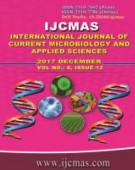


 National Academy of Agricultural Sciences (NAAS)
National Academy of Agricultural Sciences (NAAS)

|
PRINT ISSN : 2319-7692
Online ISSN : 2319-7706 Issues : 12 per year Publisher : Excellent Publishers Email : editorijcmas@gmail.com / submit@ijcmas.com Editor-in-chief: Dr.M.Prakash Index Copernicus ICV 2018: 95.39 NAAS RATING 2020: 5.38 |
Climate change is now a widely accepted phenomenon. Climate change is a serious and urgent issue. There is now an overwhelming body of scientific evidence that human activity is causing global warming, with the main sources of greenhouse gases, in order of global importance, being electricity generation, land-use changes (particularly deforestation), agriculture and transport the fastest growing sources are transport and electricity. Climate is a major force in earth’s environmental system, and even minor changes in climate can have complex and serious effects on the environment and nature. Climate changes in the past have occurred over hundreds or even thousands of years, but recent changes have received wider attention because of radical shifts occurring in just affecting life on our planet in numerous ways, but effects on agriculture and food supply may be one of the greatest threats to sustaining life. Although our understanding of how climate change affects agriculture is still developing, evidence from short-term experiments suggests that it may be affected in several ways. Crop productivity in terms of both quality and quantity, and agronomic practices such as irrigation, fertilization, weed management, and pest control could be affected significantly due to climate change. Furthermore, impacts on soil fertility due to changes in soil organic matter, drainage, and erosion could affect crop production indirectly. Assessment of the effects of global climate change factors particularly of elevated carbon dioxide (CO2) concentrations and rising temperature on agriculture and farming practices is important to anticipate and adapt practices that maximize agricultural production in future climate scenarios. Achieving sustainable crop production in unpredictable environments necessitates a holistic approach that focuses on not only increasing crop productivity but also effective management of agricultural pests such as weeds.
 |
 |
 |
 |
 |